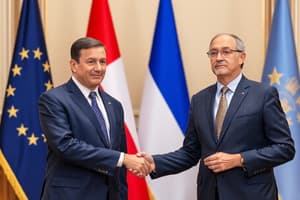Podcast
Questions and Answers
What legal principle states that a state cannot exercise sovereignty over another sovereign state?
What legal principle states that a state cannot exercise sovereignty over another sovereign state?
- Sovereign immunity (correct)
- Diplomatic immunity
- Jurisdictional immunity
- State clearance
Who enjoys absolute immunity according to the principles of diplomatic immunity?
Who enjoys absolute immunity according to the principles of diplomatic immunity?
- Consular officers
- Staff of the mission
- Diplomatic agents (correct)
- Foreign nationals
Which category of persons is NOT provided with sovereign immunity under international law?
Which category of persons is NOT provided with sovereign immunity under international law?
- Consular officers
- Foreign sovereigns
- Diplomatic agents
- International organizations (correct)
What is one of the main functions of a diplomatic mission as outlined in the Vienna Convention?
What is one of the main functions of a diplomatic mission as outlined in the Vienna Convention?
What distinguishes the immunity of diplomatic agents from that of mission staff?
What distinguishes the immunity of diplomatic agents from that of mission staff?
What is the primary responsibility of the receiving state regarding a foreign mission?
What is the primary responsibility of the receiving state regarding a foreign mission?
According to Article 22 of the Vienna Convention, who must give permission for agents of the receiving state to enter the premises of a mission?
According to Article 22 of the Vienna Convention, who must give permission for agents of the receiving state to enter the premises of a mission?
What happens to a diplomat's immunity upon leaving the receiving country?
What happens to a diplomat's immunity upon leaving the receiving country?
What does the inviolability of the mission include according to the Vienna Convention?
What does the inviolability of the mission include according to the Vienna Convention?
Which of the following incidents violated the inviolability of a diplomatic mission?
Which of the following incidents violated the inviolability of a diplomatic mission?
What is the status of the diplomatic bag according to Article 27 of the Vienna Convention?
What is the status of the diplomatic bag according to Article 27 of the Vienna Convention?
Who is entitled to complete immunity from civil acts such as divorce petitions?
Who is entitled to complete immunity from civil acts such as divorce petitions?
What does the Vienna Convention state about the premises of a foreign mission?
What does the Vienna Convention state about the premises of a foreign mission?
What forms of communication are protected by inviolability according to the Vienna Convention?
What forms of communication are protected by inviolability according to the Vienna Convention?
What type of staff does NOT enjoy immunity from civil and administrative jurisdiction relating to acts performed outside their duties?
What type of staff does NOT enjoy immunity from civil and administrative jurisdiction relating to acts performed outside their duties?
What action can a receiving state take regarding a diplomat it declares persona non grata?
What action can a receiving state take regarding a diplomat it declares persona non grata?
What is the legal term for the court's refusal to entertain a divorce petition based on diplomatic immunity?
What is the legal term for the court's refusal to entertain a divorce petition based on diplomatic immunity?
Which category of staff is only immune from civil jurisdiction for acts performed in the course of their duties?
Which category of staff is only immune from civil jurisdiction for acts performed in the course of their duties?
Who can claim personal inviolability according to the diplomatic privileges?
Who can claim personal inviolability according to the diplomatic privileges?
In the Shaw v Shaw case, why could the husband successfully strike out the petition for divorce?
In the Shaw v Shaw case, why could the husband successfully strike out the petition for divorce?
What is the primary condition for the family of a diplomatic agent to enjoy immunity?
What is the primary condition for the family of a diplomatic agent to enjoy immunity?
What is the primary reason for granting diplomatic immunity to foreign representatives?
What is the primary reason for granting diplomatic immunity to foreign representatives?
In the context of the Schooner Exchange v McFaddon case, what was the implied promise made by the Exchange upon entering the U.S. port?
In the context of the Schooner Exchange v McFaddon case, what was the implied promise made by the Exchange upon entering the U.S. port?
How is the immunity of consular officers different from that of diplomatic agents?
How is the immunity of consular officers different from that of diplomatic agents?
What are the three categories of staff within a diplomatic mission, as outlined in the content?
What are the three categories of staff within a diplomatic mission, as outlined in the content?
What international agreement provides the legal framework for diplomatic immunity discussed in the content?
What international agreement provides the legal framework for diplomatic immunity discussed in the content?
What are the protections afforded to the premises of a diplomatic mission according to Article 22 of the Vienna Convention?
What are the protections afforded to the premises of a diplomatic mission according to Article 22 of the Vienna Convention?
How does the Vienna Convention define 'premises of the mission'?
How does the Vienna Convention define 'premises of the mission'?
What obligation does the receiving state have in relation to the protection of a diplomatic mission?
What obligation does the receiving state have in relation to the protection of a diplomatic mission?
What event in 1979 exemplified a violation of the inviolability of a diplomatic mission?
What event in 1979 exemplified a violation of the inviolability of a diplomatic mission?
What does Article 39(2) of the Vienna Convention say about the cessation of immunities and privileges for diplomats?
What does Article 39(2) of the Vienna Convention say about the cessation of immunities and privileges for diplomats?
According to Article 27(2) of the Vienna Convention, what is the status of the diplomatic bag?
According to Article 27(2) of the Vienna Convention, what is the status of the diplomatic bag?
What right concerning freedom of movement is guaranteed by Article 26 of the Vienna Convention to members of a mission?
What right concerning freedom of movement is guaranteed by Article 26 of the Vienna Convention to members of a mission?
In what manner must the receiving state ensure the protection of the privacy of a diplomat's residence and communication?
In what manner must the receiving state ensure the protection of the privacy of a diplomat's residence and communication?
What are the three categories of staff in a diplomatic mission?
What are the three categories of staff in a diplomatic mission?
In the Shaw v Shaw case, what grounds did the husband use to claim immunity from the divorce petition?
In the Shaw v Shaw case, what grounds did the husband use to claim immunity from the divorce petition?
What conditions must be met for the family of a diplomatic agent to enjoy immunity?
What conditions must be met for the family of a diplomatic agent to enjoy immunity?
How does the immunity of the administrative and technical staff differ from that of heads of mission?
How does the immunity of the administrative and technical staff differ from that of heads of mission?
What authority does a receiving state have regarding a diplomat designated as persona non grata?
What authority does a receiving state have regarding a diplomat designated as persona non grata?
What level of immunity do service staff enjoy under diplomatic privilege?
What level of immunity do service staff enjoy under diplomatic privilege?
What principle is affirmed by the personal inviolability of diplomatic agents and their families?
What principle is affirmed by the personal inviolability of diplomatic agents and their families?
What happens to the status of a diplomat if the receiving state does not accept their continuation after declaring them unacceptable?
What happens to the status of a diplomat if the receiving state does not accept their continuation after declaring them unacceptable?
Flashcards
Sovereign Immunity
Sovereign Immunity
The principle that a state cannot exercise sovereign authority over another sovereign state.
Case of the Schooner Exchange v McFaddon
Case of the Schooner Exchange v McFaddon
A ship belonging to the Emperor of France was forced to enter the port of Philadelphia due to bad weather. Two Americans claimed ownership of the ship, claiming they seized it on the high seas. The court held that the ship was exempt from the jurisdiction of the United States while it was in port.
Jurisdictional Immunities
Jurisdictional Immunities
Certain categories of persons and bodies are immune from the jurisdiction of local courts, including foreign sovereigns, diplomatic agents, and consular officers.
Diplomatic Immunities
Diplomatic Immunities
Signup and view all the flashcards
Staff of the Mission
Staff of the Mission
Signup and view all the flashcards
What is inviolability?
What is inviolability?
Signup and view all the flashcards
What is the responsibility of the receiving state towards a diplomatic mission?
What is the responsibility of the receiving state towards a diplomatic mission?
Signup and view all the flashcards
Can the host country enter a diplomatic mission?
Can the host country enter a diplomatic mission?
Signup and view all the flashcards
What kind of protection does the receiving state provide to diplomatic mission members?
What kind of protection does the receiving state provide to diplomatic mission members?
Signup and view all the flashcards
Are diplomatic mission members free to move and communicate?
Are diplomatic mission members free to move and communicate?
Signup and view all the flashcards
What is the status of a diplomatic mission's archives and documents?
What is the status of a diplomatic mission's archives and documents?
Signup and view all the flashcards
What is the status of the Diplomatic Bag?
What is the status of the Diplomatic Bag?
Signup and view all the flashcards
When do diplomatic immunities and privileges end?
When do diplomatic immunities and privileges end?
Signup and view all the flashcards
Chargé d'affaires
Chargé d'affaires
Signup and view all the flashcards
Diplomatic Staff
Diplomatic Staff
Signup and view all the flashcards
Persona Non Grata
Persona Non Grata
Signup and view all the flashcards
Inviolability of Diplomatic Agents
Inviolability of Diplomatic Agents
Signup and view all the flashcards
Immunity from Civil Jurisdiction (For Family)
Immunity from Civil Jurisdiction (For Family)
Signup and view all the flashcards
Diplomatic Immunity: Nationality Exception
Diplomatic Immunity: Nationality Exception
Signup and view all the flashcards
Consequences of Unrecalled Persona Non Grata
Consequences of Unrecalled Persona Non Grata
Signup and view all the flashcards
Diplomatic Immunity: What does it mean?
Diplomatic Immunity: What does it mean?
Signup and view all the flashcards
Who is the Chargé d'affaires?
Who is the Chargé d'affaires?
Signup and view all the flashcards
What is a Persona Non Grata?
What is a Persona Non Grata?
Signup and view all the flashcards
What is the 'Expulsion of Diplomats' procedure?
What is the 'Expulsion of Diplomats' procedure?
Signup and view all the flashcards
Inviolability of Diplomatic Missions
Inviolability of Diplomatic Missions
Signup and view all the flashcards
Immunity of Mission Staff
Immunity of Mission Staff
Signup and view all the flashcards
Immunity from Civil Jurisdiction (Diplomats and Family)
Immunity from Civil Jurisdiction (Diplomats and Family)
Signup and view all the flashcards
Protection of Diplomatic Personnel
Protection of Diplomatic Personnel
Signup and view all the flashcards
Inviolability of Diplomatic Premises
Inviolability of Diplomatic Premises
Signup and view all the flashcards
Protection against Intrusion and Damage
Protection against Intrusion and Damage
Signup and view all the flashcards
Inviolability of the Diplomatic Bag
Inviolability of the Diplomatic Bag
Signup and view all the flashcards
Inviolability of Diplomatic Archives
Inviolability of Diplomatic Archives
Signup and view all the flashcards
Cessation of Diplomatic Immunities
Cessation of Diplomatic Immunities
Signup and view all the flashcards
Freedom of Movement and Communication
Freedom of Movement and Communication
Signup and view all the flashcards
Study Notes
Diplomatic Immunity
- Diplomatic relations are based on mutual consent between the sending and receiving states
- Protecting representatives of other states is essential to enable them to perform their international political functions without fear of prosecution. This is based on the Vienna Convention on Diplomatic Relations.
- The mission's role, according to Article 3 of the Vienna Convention, includes representing the sending state, safeguarding its interests, and those of its nationals.
- The Vienna Convention on Diplomatic Relations (VC on Diplomatic Relations) is central to understanding the details of diplomatic immunity.
Jurisdictional Immunities
- The principle underlying the doctrine of jurisdiction is a natural extension of the immunity held by individual sovereigns.
- Sovereign immunity means a state cannot exercise sovereign domain over another sovereign state. Evidence of this can be seen in Case of the Schooner Exchange v McFaddon.
- In the Case of the Schooner Exchange v McFaddon, a French ship, forced into port by bad weather, was seized by Americans. Americans claimed ownership of the ship, arguing its seizure on high seas was rightful. However, the court held that the ship's entry into US territory implied an agreement that it would be exempt from US jurisdiction during that time.
International Law Immunities
- Certain categories of people and bodies are immune from municipal (local) courts' jurisdiction.
- Foreign sovereigns and foreign states (state immunity) are immune.
- Diplomatic agents of a foreign state (Vienna Convention) are immune.
- Consular officers of a foreign state are also immune (though not to the same extent as diplomats).
Staff of Mission
- Absolute immunity applies to the head of mission.
- Qualified immunity applies to mission staff.
- Diplomatic agents (head of mission, chargé d'affaires, staff members) receive immunity from the receiving state unless they are nationals of that state.
- This immunity covers both official and private acts in the case of those who are not nationals or permanent residents of the receiving state.
- This includes civil matters, such as divorce proceedings. This was established in Shaw v Shaw, where a diplomatic agent was immune from a divorce suit.
Staff Categories
- Diplomatic agents - heads of mission, chargés d'affaires, staff members (e.g., counselors, attachés, secretaries).
- Administrative and technical staff - clerks, typists, translators, radio/telephone operators, and their families, provided they are not nationals or permanent residents of the receiving state. This group is immune only for acts within the scope of their official duties.
- Service staff such as butlers and maids are only immune for acts performed in the course of their official duties
Expulsion of Diplomats
- A receiving state can declare a head of mission or staff member "persona non grata" at any time.
- Usually, the sending state will recall the diplomat. If not, the receiving state does not have to consider them a member of the mission.
Inviolability
- All diplomats and their family members, provided they're not nationals or permanent residents of the receiving state, are personally inviolable.
- The receiving state must protect them from violence, attacks on dignity, and threats to their freedom.
- This protection extends to private residences, documents, and correspondence.
- The premises of the mission, regardless of ownership, are inviolable.
- Receiving state agents may not enter the mission without permission of the head of mission. This was recognised in an 1896 case involving Sun Yat Sen, the Chinese refugee.
Inviolability of Archives and Documents
- Official correspondence and the diplomatic bag (pouch) are inviolable.
- The receiving state usually permits movement and communication of the mission's personnel.
Cessation of Immunity
- Diplomatic immunity normally ends when a diplomat leaves the receiving country or when their term expires.
Waiver
- Personal Immunity involves actions taken outside an official capacity.
- If a diplomat returns to the receiving state as a private individual, they may be held accountable for their personal actions.
- Immunity can be waived by the sending state, and any waiver must be explicitly stated.
Studying That Suits You
Use AI to generate personalized quizzes and flashcards to suit your learning preferences.
Related Documents
Description
This quiz explores the principles of diplomatic relations, focusing on the essentials of diplomatic immunity as outlined in the Vienna Convention on Diplomatic Relations. It also examines the doctrine of jurisdictional immunities, particularly in the context of sovereign immunity and relevant case law.




